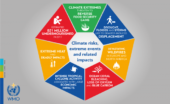Molly Minturn - My family is heartbroken to share that my father died in surgery on Monday, Feb. 10. It…
Invest in the planet and clean up
Written by Diana Thebaud Nicholson // August 16, 2009 // Clean energy/renewables, Economy, Science & Technology // Comments Off on Invest in the planet and clean up
Native American group and others invest in algae biofuel
The Southern Utes tribe, one of the wealthiest Native American tribes because of its investments in energy, is a major investor in a company co-founded by a Colorado State University professor that hopes to grow algae as a biofuel that absorbs carbon emissions. The startup is one of a number of companies that seeks to capture carbon emissions and create a vegetable oil-type biofuel using algae. The New York Times (8/16)
East Asia looks to lead on green power
Asia is leading the charge to develop more eco-friendly technology, with Japan and South Korea partnering with Beijing to combine their engineering prowess with China’s manufacturing capabilities. The three have individually put significant investment into new technologies, outpacing the U.S. TIME (6/25)
What a great idea and why can’t we do it in Montreal??
Philadelphia creates green jobs to weatherize row houses
(Planet Ark) The City of Brotherly Love is tackling rising unemployment and improving the energy efficiency of homes by training people to weatherize its estimated 400,000 low-income row houses. During a four-week program that started in mid-April, the trainees learn skills – how to install insulation, caulk windows, seal basements and assess fuel usage in city houses -to earn a living meeting the increased demand for energy efficiency. They are trained in 19th- and early 20th-century row houses and at a training center in the city.
The program, run by the Energy Coordinating Agency (ECA), a private nonprofit, is part of the city’s new “Greenworks Philadelphia” sustainability plan that aims to boost areas such as recycling, renewable energy and emissions control while creating “green-collar” jobs in a tough economy. Over the next five years, the city aims to weatherize 100,000 row homes.
26 April
Military embraces green energy
(LA Times) A Mojave Desert Army base is full of plug-in cars, solar panels and new experiments. Liberal agenda? Nah, it’s about saving money, even lives. But the Defense Department could cement a national trend.
The desert base, which houses the Army’s premier training center for troops deploying to Iraq and Afghanistan, has become a testing ground and showcase for green initiatives that officials estimate could save the services millions, trim their heavy environmental “boot-print” and even save lives in the war zones, where fuel convoys are frequent targets.
1 December 2008
India Green Spending Could Reach $150b By 2017 – Report
SINGAPORE – Biofuels, wind and clean coal are among the top climate change investment themes for India, global bank HSBC says in a report, highlighting sectors expected to attract spending of $150 billion between 2008 and 2017.
19 November
Environmentalists promote ‘green stimulus’
Governments can save the economy and the planet, they say, by spending on mass transit, renewable energy and fuel-efficient cars
(Globe & Mail) Saving the economy and saving the planet at the same time were once considered two mutually incompatible goals. But not any longer.
A chorus of proposals from liberal-leaning think tanks and conservation organizations is suggesting that the best way to revive the faltering economy would be to finance solutions to pressing environmental problems.
Supporters are calling the idea “green stimulus.” They argue that directing new government expenditures to wind farms, solar panels, gas-sipping cars and mass-transit infrastructure, among other items, would give a far bigger boost to the economy than tax cuts or government rebates.
The environmental funding would have the side benefit of helping solve such problems as global warming by spurring the development of less-polluting energy sources and increased energy efficiency.
Clean energy investment takes a hit
Investment in clean energy fell 24% from the last financial quarter, a drop that analysts say may cause some clean technology firms to struggle. Though clean energy investment has skyrocketed over the last four years, many of the companies who have benefited are still young and require access to capital and credit in order to expand. Financial Times (11/10)
22 October
UN endorses Green New Deal to spur global economy, address environment
The UN Environment Programme, echoing some prominent politicians such as U.S. Democratic presidential nominee Barack Obama, called for spending on new green infrastructure as a way to restore confidence in global markets. A so-called Green New Deal would address the specter of another global crisis prompted by catastrophic climate change as well. Such a program may come up for discussion during the global Financing for Development-Doha Review conference next month. The Guardian (London) (10/22)
Bailout (and Buildup)
Thomas L. Friedman, NYT
“Is the economic crisis going to be the end of green?” asks David Rothkopf, energy consultant and author of “Superclass.” “Or, could green be the way to end the economic crisis?” It has to be the latter. We can’t afford a financial bailout that also isn’t a green buildup — a buildup of a new clean energy industry that strengthens America and helps the planet.
29 August
Taiwan’s Eco-friendly Industry
Green Is Gold
By Huang jing syuan&Wang siao mei
(CommonWealth Magazine) For Taiwan’s top conglomerates, green industry is rapidly becoming the new cash cow. No longer on the fringe, environmental protection is now a critical consideration impacting sales and brand image.
20 August
Climate resolutions ‘having big impact’
A coalition of investors and environmental groups claimed on Wednesday that climate change-related shareholder resolutions filed in the US this year had achieved breakthrough results, reflecting growing investor concerns over global warming.
Of 57 resolutions filed by a range of socially concerned investors, almost half were withdrawn after companies ranging from Continental Airlines to El Paso made commitments on setting targets for reducing greenhouse gas emissions and other issues.
July 31
Thomas Friedman in the NYT
…. Anyone who looks at the growth of middle classes around the world and their rising demands for natural resources, plus the dangers of climate change driven by our addiction to fossil fuels, can see that clean renewable energy — wind, solar, nuclear and stuff we haven’t yet invented — is going to be the next great global industry. It has to be if we are going to grow in a stable way.
Therefore, the country that most owns the clean power industry is going to most own the next great technology breakthrough — the E.T. revolution, the energy technology revolution — and create millions of jobs and thousands of new businesses, just like the I.T. revolution did. Full article
July 1
Renewable energy is “green gold rush”: U.N. report
LONDON (Reuters) – In what is being called a “green gold rush,” global investment in renewable energy surged some 60 percent to $148 billion in 2007, a UN agency said on Buoyed by soaring fossil-fuel prices and concerns over the carbon dioxide emissions that fuel global warming, investment in clean energy from sources like wind, solar and biofuels last year rose three times faster then predicted by the UN Environmental Program (UNEP).
Clean Energy Investments Charge Forward Despite Financial Market Turmoil
(UNEP) With end of cheap oil, renewables and energy efficiency attracts fast-growing interest;
New investment surpasses $148 billion in 2007, a 60% rise from 2006, Growth continues in 2008, UNEP study says
Climate change worries, growing support from world governments, rising oil prices and ongoing energy security concerns combined to fuel another record-setting year of investment in the renewable energy and energy efficiency industries in 2007, according to an analysis issued Tuesday July 1 by the UN Environment Programme (UNEP).
Over $148 billion in new funding entered the sustainable energy sector globally last year, up 60% from 2006, even as a credit crunch began to roil financial markets, according to the report, “Global Trends in Sustainable Energy Investment 2008,” prepared by UK-based New Energy Finance for UNEP’s Paris-based Sustainable Energy Finance Initiative. Download Report
April 18
Billionaire Texas oil man makes big bets on wind
WASHINGTON (Reuters) – Legendary Texas oil man T. Boone Pickens has gone green with a plan to spend $10 billion to build the world’s biggest wind farm. But he’s not doing it out of generosity – he expects to turn a buck.
Next month, Pickens’ company, Mesa Power, will begin buying land and ordering 2,700 wind turbines that will eventually generate 4,000 megawatts of electricity – the equivalent of building two commercial scale nuclear power plants – enough power for about 1 million homes.
The cost of fighting climate change
As financial markets around the world are suffering and the U.S. possibly sliding into a recession, how would the steep price tag for taking on climate change affect the fragile global economy? Experts are not united on this question, but many say that paying now to rein in greenhouse gas emissions is a wise long-term investment and possibly also good short-term one as it may promote a whole new industry. BusinessWeek (4/3)
January 27, 2008
Leading article, The Independent
Reading, as we know, is not George Bush’s strongest suit, but he should at least glance at the graphs of a new report before his latest initiative on global warming opens in Hawaii this week. They show that his whole approach to tackling global warming – by relying on voluntary initiatives from industry to come up with technological breakthroughs – is doomed to failure. That may be just what he intends – so Gordon Brown and the other leaders of the major developed and developing economies represented at the mid-Pacific meeting should read the report, too.
The rest of the world almost boycotted the get-together in the face of United States’s intransigence at the crucial international negotiations in Bali last month, suspecting, quite rightly, that it is a diversionary tactic intended to impede progress towards agreement on worldwide mandatory targets for cutting emissions of carbon dioxide. Now they should dismiss it as a palpable waste of time.
For the survey of 500 top companies by the consultancy, Accenture, makes it clear that they have no intention of taking the lead. Only 5 per cent describe climate change as their top priority, with not a single business in China doing so. Only 11 per cent even put it second or third. It ranks far below such concerns as increasing sales and competing for talented staff. More than two-thirds see measures to tackle global warming as a burden, imposing costs on operations – around twice as many as understand that it presents opportunities for increasing business.
Their attitude is understandable, though short-sighted. It is hard to criticise top executives for being preoccupied with increasing sales and recruiting the best people. But it is sad that more have not realised that being seen to tackle climate change helps them to achieve both aims, and boosts the bottom line. As the report itself makes clear, consumers are increasingly attracted to greener companies: “Environmental responsibility is quickly becoming an important factor in a buyer’s decision to purchase a particular product or service,” it concludes, “and this trend will only accelerate.”
Most strikingly it found that 97 per cent of consumers in China are concerned about climate change, well above the already high global average of 85 per cent. And a survey by the US National Marketing Institute has shown that half of Americans say they would be more likely to buy shares in relatively environmentally friendly companies, and that investment in green and ethical funds has mushroomed.
Another study found that three-quarters of MBA students at top business schools said they would be willing to accept a pay cut of 10 to 20 per cent to work for a socially responsible company. Whether or not they would actually do so, when it came to it, there is no doubt that pioneering green companies such as Google and BSkyB find their environmental stances and practices invaluable when it comes to recruiting young staffs – particularly so for the most talented top few per cent, on whom the future of any business depends.
Even more important, climate change – and the measures brought in to address it – is going to fundamentally change the world economy, create a need for new products, and open up new markets. The companies that see, and seize, the opportunities first stand to clean up. Prophets will make the big profits.
The main thing stopping most companies from taking the plunge is uncertainty about what governments will do. While two-thirds of those surveyed accept that they have a role to play in tackling climate change, only 42 per cent worldwide – and 14 per cent in China – feel well-placed to do so. As the heads of blue-chip firms from Tesco to Dupont, BP to General Electric have repeatedly told the Bush administration and other governments, they need a clear framework of targets for increasing reductions in carbon dioxide to be able to plan for the future and commit the necessary investment. In this, they have been as vocal as any environmental group.
This is where President Bush’s recalcitrant attitude has been so devastating. By taking every opportunity to impede progress, he has allowed the uncertainty to continue, thus putting in peril the economic objectives he claims to serve. The time has come for this to stop. The Hawaii meeting is as good an opportunity as any to make a stand. Whenever the rest of the world has united against him on global warming he has shifted ground, one reason why Tony Blair’s repeated efforts to cuddle close to him were so damaging.
The negotiations in Bali were rescued because the other participants told the US to change its stance or “get out of the way”. They should start in Hawaii, where they left off on the “island of the gods”.
See also Big business says addressing climate change ‘rates very low on agenda’ Poll of 500 major firms reveals that only one in 10 regard global warming as a priority



